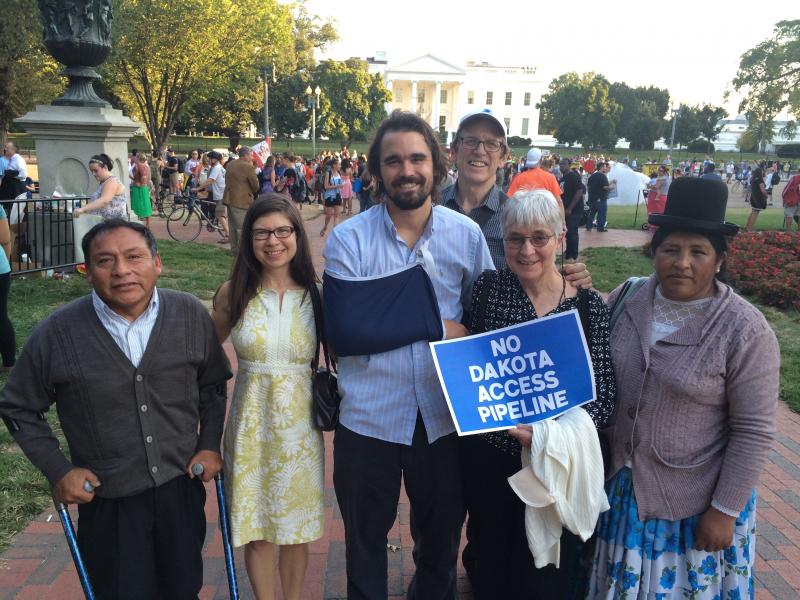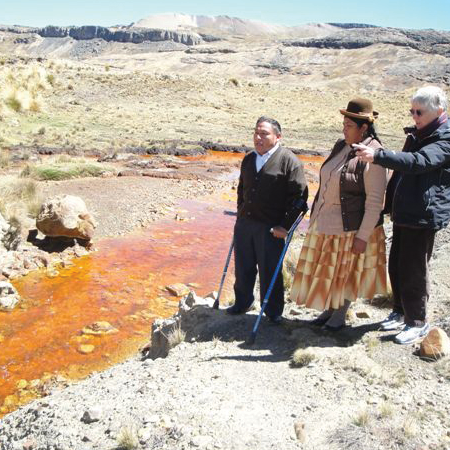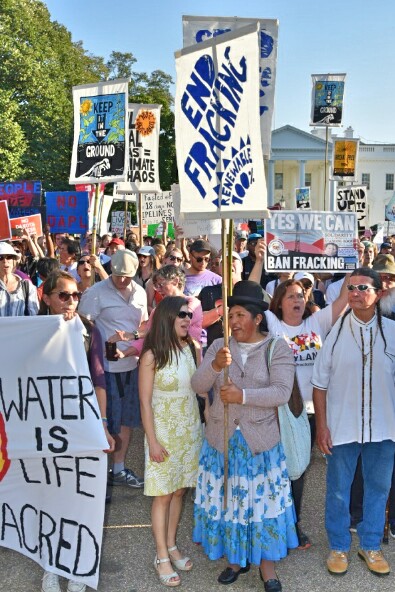Solidarity is beautiful
Maryknoll missioners work to create a climate where peace can flourish by standing in solidarity with indigenous peoples in Peru and around the world.
“We are the people. You can’t ignore us. We will not let you build this pipeline . . . We are the people. You can’t ignore us. We will not let you build this pipeline.”
Again and again, hundreds of people, many of them native American Indians, chanted in unison outside the White House. They had come to protest the construction of an oil pipeline on the Standing Rock Reservation in North Dakota because of the devastation a potential oil spill would cause to the soil and water.
In the crowd was Yolanda Flores, a 45-year old Aymara indigenous woman who works as a secretary in the impoverished altiplano (high plains) of Puno, Peru, where companies mining for silver, lead, copper and other minerals have devastated the soil and water that her people have revered as sacred for thousands of years.
Yolanda was impossible to miss in her traditional Aymara dress: Her long hair plaited into two dark braids gathered at the end by a black tassel made of wool, a many-layered floral skirt, a sweater to ward off chilly Peruvian mountain air not present in late summer in Washington, D.C., and a bowler hat.
How Yolanda came to be in Washington, D.C. and why she supports this cause of the Sioux indigenous peoples in North Dakota – a place she has never been – is a story crafted over more than seventy years with accompaniment, service, and advocacy by Maryknoll missioners at local, national, and international levels.
Photo: Yolanda Flores holds up an “End Fracking” sign outside of the White House on September 14, 2016. Also pictured is Chloe Schwabe (left of Yolanda), staff member of the Maryknoll Office for Global Concerns in Washington, D.C. Photo by Gerry Lee/MOGC.
Water is life
 Yolanda grew up as the daughter of peasant farmers in Puno, a cold, remote highland region in southern Peru notorious for its difficult living conditions. Since her parents were children, Maryknoll missioners have been actively involved in the Catholic Church and community life in Puno and throughout Peru.
Yolanda grew up as the daughter of peasant farmers in Puno, a cold, remote highland region in southern Peru notorious for its difficult living conditions. Since her parents were children, Maryknoll missioners have been actively involved in the Catholic Church and community life in Puno and throughout Peru.
Maryknoll missioners established parishes, schools, a seminary, a radio station, credit cooperatives, community libraries, and pharmacies, and trained countless numbers of catechists, health promoters and agricultural promoters that operated on both the local and national level. They have integrated the proclamation of the Good News with sacramental life, human promotion, and a commitment to identifying with those who are impoverished and marginalized.
In their desire to promote the culture of the people they served, Maryknoll missioners established the Institute of Aymara Studies in 1974. The Aymara culture teaches that a sacred and spiritual connection exists between the Aymara people and the land and water.
Photo: Cristobal Yugra (DHUMA), Chloe Schwabe (MOGC), Alfonso Buzzo (MOGC), Gerry Lee (MOGC), Maryknoll Sister Patricia Ryan (DHUMA) and Yolanda Flores (DHUMA) at Dakota Access Pipeline protest at the White House on September 14, 2016. Photo by Andrew Miller.
“Water is life and cannot be privatized,” explains Benecio Quispe Gutiérrez, an Aymara intellectual and activist, quoted by Jeffery Weber in his book Red October. “They cannot privatize water, llamas, sheep, cows, and trees. We need them all.”
The Aymara peoples include their traditional reverence for Mother Earth in their Catholic faith life.They make offerings to Mother Earth in gratitude for a good harvest and good health.
“For [indigenous communities],” Pope Francis writes in Laudato Si’, “land is not a commodity but rather a gift from God and from their ancestors who rest there, a sacred space with which they need to interact if they are to maintain their identity and values. When they remain on their land, they themselves care for it best.”
Unfortunately, rapid and uneven economic development, coupled with longstanding racial and social inequalities, has often made the Aymara peoples vulnerable to exploitation by the government and by national and international private corporations, particularly in the mining industry, which is the country’s largest export industry.
Where Yolanda lives, the land is rich with silver, lead, and copper. Over the years, mines have polluted the soil with heavy metals and cut off many-decades-old sacred communal wells from their farms. In 2008, Yolanda witnessed her neighbors’ frustration overflow into violence when Canadian Bear Creek Mining Corporation received a permit to build a mine on Aymara land through what many of the people believed to be duplicitous behavior and false claims, then failed to attend a public meeting where hundreds of community members hoped to have their questions answered. Some people destroyed one of the mining company’s empty buildings.
But violence is not the way of the Aymara peoples. The Aymara culture teaches a social obligation to help other members of the community. An Aymara peasant might ask a neighbor for help building a house, digging an irrigation ditch, or harvesting a field. In return, he or she is expected to donate the same number of days’ labor to the neighbor. Mutual aid and care for the common good supports right relationships between the Aymara peoples and between each person and the land and water.
There was another meeting in 2011. More than a thousand people came but the meeting space could only accommodate 200. This time representatives from the company did attend but they offered information about the mine in technical terms that few people understood and in Spanish rather than the Aymara language. They also said they would only accept inquiries from the public in written form. Since Aymara is a spoken rather than written language, this was seen by many as yet another tactic by the company to obstruct their right to refuse the concession.
With the accompaniment of Maryknoll Sister Patricia “Pat” Ryan, the Aymara people embarked on a massive campaign of nonviolent resistance. More than 15,000 indigenous peoples blocked roads in and around Puno for nearly six months. “There were strikes on the border with Bolivia,” Sister Pat recalled. “When they weren’t heard there they came in closer to Puno until eventually they closed the road all the way from the border with Bolivia to the city of Puno, which is about 150 kilometers. Everything was totally immobilized: The markets closed; there was no transportation; tourism was shut down. They were trying to get their voices heard about this mine being allowed into their area without their consent and without their full knowledge of what this would mean for their lives.”
The government, faced with the possibility of more demonstrations and more lawsuits, took a surprising step – it revoked the mining company’s permit and shut down construction of the mine.
The spirit of Maryknoll in Puno
“Being an indigenous woman from a remote area,” Yolanda said, “I always thought that the world was tiny: you grow up, you get married, you have a family, and you work the fields until you die.” . . . “Meeting Maryknoll Sisters and Fathers and Brothers helped me to go further. I work on issues I never thought I could, like protecting Aymara people’s human rights and the care of the environment.”
Yolanda works for the Association of Human Rights and the Environment (Derechos Humanos y Medioambiente), or DHUMA. This nonprofit was formed in 2007 after the closure of the Vicariate of Solidarity of the Prelature of Juli, which was founded by the Maryknoll Fathers and Brothers, to carry on the work of defending the rights of impoverished and marginalized people and to create a climate of peace in the region. At that time, in a highly controversial decision, the newly-appointed Bishop Jose Maria Ortega Trinidad instructed all Maryknoll Fathers and Brothers to leave the diocese of Juli after 65 years of service. In a public letter signed by more than 1,000 people, the parishioners of Juli said “The Maryknoll Fathers will never be far from our hearts or out of our memories and this we want to express publicly to the world and to the whole Church.”
“I feel the spirit of Maryknoll Sisters and Fathers in the daily struggles of our Aymara communities,” said Cristobal Yugra, an Aymara indigenous man and lawyer at DHUMA who traveled to Washington, D.C. with Yolanda and Maryknoll Sister Patricia ‘Pat’ Ryan. Together they offer educational services, information and legal advice to local communities impacted by mining.
Defending Mother Earth
 Yolanda, Cristobal and Sister Pat came to D.C. from Peru at the invitation of an international court established within the World Bank to arbitrate grievances concerning trade deals. The court was hearing a case brought by Bear Creek Mining Corporation against the government of Peru after the government revoked the company’s mining permit in Puno.
Yolanda, Cristobal and Sister Pat came to D.C. from Peru at the invitation of an international court established within the World Bank to arbitrate grievances concerning trade deals. The court was hearing a case brought by Bear Creek Mining Corporation against the government of Peru after the government revoked the company’s mining permit in Puno.
The company is suing Peru for $522 million in future expected lost profits not just from their initial silver mine but also from a second mine they had planned to develop with the profits from the first mine.
The court accepted DHUMA’s amicus brief which refutes many of the company’s arguments. “We’re trying to make known what really happened in the area according to the Aymara peoples’ perspective,” Sister Pat said.
This was the first time that the Maryknoll Office for Global Concerns is aware of this controversial international court not only accepted a brief written by community members with a strong local interest in the matter, but also invited them to attend the hearings in order to call on them to respond immediately to requests for additional evidence. It may also be the first time that the court agreed to make hearings available to the public via livestreaming. Usually these hearings are held behind closed doors and the public has no knowledge of the internal dialogue until after a decision is made.
Photo: Cristobal Yugra, Yolanda Flores and Maryknoll Sister Patricia “Pat” Ryan, at the Condoraque River, a river of burning water due to acid drainage and toxic sludge from mining activity. Photo courtesy of the Maryknoll Sisters.
It was on their one day off from the week-long court hearings that they joined the Dakota Access Pipeline protest. Not only was it a remarkable moment to have indigenous peoples in the United States acting as water defenders and protectors of Mother Earth just as the Aymara peoples in Peru, but also it was an impressive demonstration of the right and duty of all people to participate in society in nonviolent action, seeking together the common good and well-being of all, especially those who are impoverished and marginalized. At one point, protesters raised their fists in unison as they chanted and Yolanda asked, “Am I allowed to raise my fist?” Fortunately, yes, in the United States she is allowed to raise her voice and her fist without threat of a violent response from the government.
Now back in Peru, Yolanda is continually searching the internet for governmental maps of the region that detail where mining concessions have been approved by the government without the consent of local communities. Sister Pat is meeting with those communities, to let them know if concessions have been made in their territory and to educate them about their rights and ways to nonviolently defend themselves on the local, national, and international level. And Cristobal carries on legal actions against the government of Peru.
“When we first started to pursue cases on behalf of communities, local courts didn’t know what to do with our cases – they had never seen this kind of constitutional action before,” Sister Pat explained. “Our cases were often filed away and thrown out. But we have kept appealing and appealing. Two of them are now in the highest court in Peru. It’s taking a long time for decisions to be made in these cases because the court knows that if they were to issue a ruling in our favor, it would mean all of the mining concessions in the country [since 1995 when Convention No. 169 of the International Labor Organization was ratified by Peru] would need to be suspended until local communities are ‘duly informed and consulted’ about whether they want a concession in their community.”
Despite the fact that Peru is a giant of the global mining industry – it is the world’s second largest producer of copper and silver, the sixth largest global producer of gold, and it has significant reserves of coal, iron ore, silver, tin, sulfur and zinc – the indigenous peoples who are most socially marginalized and disproportionately affected are leading the way to protect water and land for all people in Peru and to deal with social conflict in nonviolent ways.
“The Maryknoll Office for Global Concerns showed us that most struggles are interconnected,” Cristobal said. “During this trip I have seen connections that were once obscure. I didn’t know that the struggle of our people in Puno for natural resources is not an isolated event. Worldwide we are seeing indigenous people and campesinos rising up against huge corporations that are extracting Mother Earth’s resources.”

